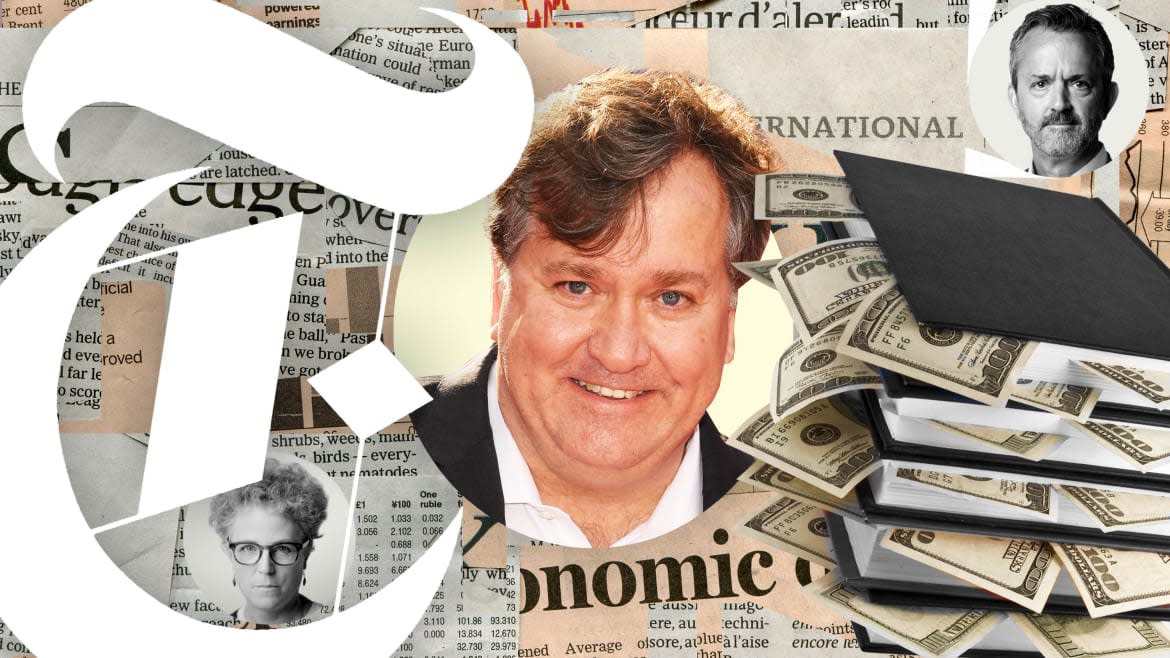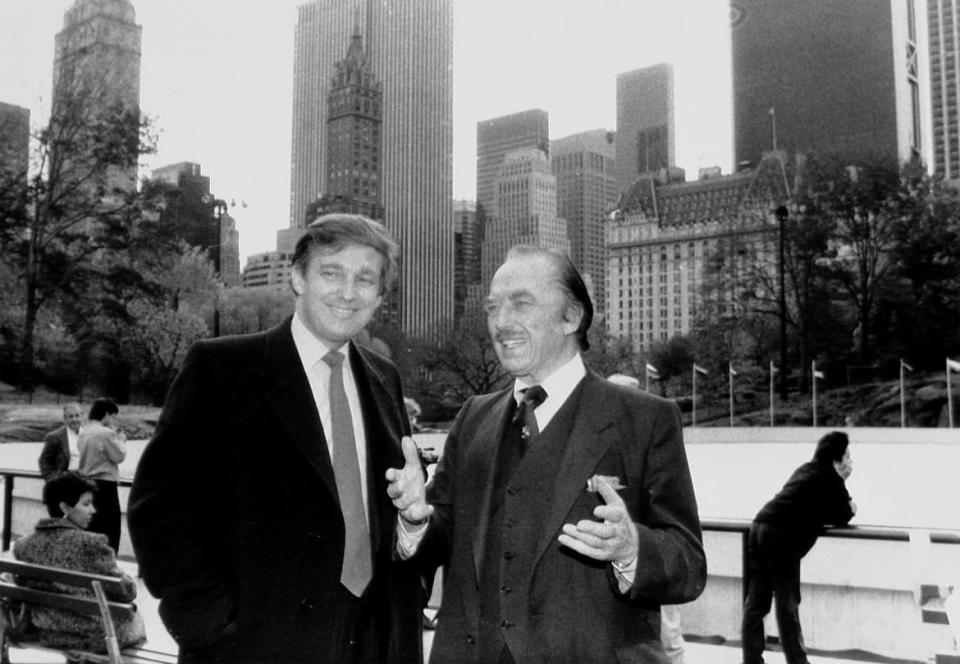New York Times’ Trump Tax Team Imploded When Star Reporter David Barstow Went Rogue

On April 15, the New York Times staff gathered in the newsroom, looking up at Executive Editor Dean Baquet on a crimson staircase where he announced to rapturous applause that reporters David Barstow, Susanne Craig and Russ Buettner had won the Pulitzer Prize for their groundbreaking story on President Trump’s taxes.
The trio “shattered Donald Trump’s myth of self-made billionaire,” Baquet said, exposing how the president and his family had evaded paying taxes for decades and committed “outright fraud.” Their story drew the fury of Trump who labeled it a “hit piece” from the “failing New York Times” and threatened to sue the paper.
The reporters spoke after Baquet. Craig paid special tribute to their sources.
“I wish they could stand here today with us. Some took great risks to get us the information we needed to expose the truth—and as people in power work to hide the truth—sources become even more important to what we do. They deserve safe harbor and to know they are in good hands,” she said.
Almost no one in the room that day was aware that the team was at each other’s throats.
Barstow had gone behind his colleagues’ backs to try and ghostwrite a book with the source for a massive payday—a move expressly forbidden by Times ethics rules, according to two people familiar with the situation. He pursued the source even after editors told him not to do the book and after his Pulitzer-winning colleagues stopped working with him over it.
Barstow went so far as to make a surprise visit to the source’s residence that left the source “freaked out.” Materials the source gave to Barstow have still not been returned despite a demand by lawyers, according to the people familiar with the matter.
Barstow told The Daily Beast he considered leaving the Times in order to write the book, but strenuously denied he did anything wrong. In a statement, Baquet said such a ghostwriting gig was “unacceptable” but that Barstow did not violate the paper’s ethics guidelines because the plan was ultimately scuttled.
Former Times editors, however, were shocked by the chain of events.
“I’m astonished at the idea that any reporter involved in a sensitive investigative project for an organization like the New York Times would attempt to go separately to sources and try and profit from them,” said Clark Hoyt, who served as public editor from 2007 to 2010.
Former executive editor Jill Abramson called the situation virtually unheard of.
“It doesn’t sound like the David Barstow I knew for years,” she said. “He was highly ethical and careful protecting sources. I never encountered a similar situation when I was at the Times. I’m trying to think of a situation like this and I can’t. ”
The Trump taxes team was made up of three of the paper’s top reporters from its investigations unit. Buettner, a 13-year Times veteran, was a finalist for the Pulitzer in 2012 and had been reporting on Trump’s personal finances since 2016. Craig joined the Times in 2010 after working for the Wall Street Journal, where she was a Pulitzer finalist for her work covering the 2008 financial crisis.
Barstow started at the Times in 1999 where he became the first reporter anywhere to win four Pulitzers. He shared the Pulitzer in 2004 for exposing employers who broke safety rules that killed or injured hundreds of workers. In 2009 he won another for an investigative series about the Pentagon’s covert campaign to influence coverage of the Iraq and Afghanistan wars. In 2013 he shared a Pulitzer after exposing Walmart for paying bribes in Mexico. (Walmart paid the U.S. government a $282 million fine last week.)
Barstow, 56, is credited with being able to nail complex stories and gain the trust of sources, according to seven current and former Times colleagues. But they also described him as a “wrecking ball” who “does not play nice with others,” particularly on group reporting projects.
The trio began work in 2017 in a locked room on the fourth floor of the Times, sealed off from the investigations team and the larger newsroom, where the story took on an almost mythical existence.
They reviewed more than 100,000 pages of complex financial documents, including 200 tax returns, and developed multiple highly confidential sources. They spent most of the next year peeling away at a half-century of the Trump family’s fortune that the president has fought so hard to conceal.
After 18 months of work, the Times published their 14,000-word investigation on the paper’s front page on Oct. 3, 2018. What it revealed was jaw-dropping.
The story showed how Fred Trump’s children used a sham company to funnel money from his empire to them without paying taxes and uncovered how the Trumps manipulated the value of properties to pay a fraction of the taxes owed to the government. The story also revealed that Trump had received more than $400 million in today’s dollars from his father’s real estate empire—not a “small loan” as he has claimed.
During the course of the reporting, a source had expressed interest in writing a book about Trump and asked the team how to proceed with such a project, Barstow told The Daily Beast.
Barstow said that he, Craig, and Buettner gave feedback on a “draft proposal” and suggested “several literary agents,” including his own, Andrew Wylie. “I made the introduction. Again, this was done after discussions within our team,” Barstow said.
Craig and Buettner say they did not receive a book proposal from the source. Rather, they said they received draft chapters and contend they did not give the source advice or feedback. The pair say they did not suggest agents and that it was Barstow who suggested one—his own.
On Oct. 15, less than two weeks after the Trump tax story published, the source met with Wylie at his Manhattan offices where Wylie said Barstow would ghostwrite the book.
The source was furious at Barstow and Wylie’s proposal.
“The source felt like they had walked into an ambush,” said a person with knowledge of the meeting. “They did not want Barstow as their ghostwriter. They didn’t want a ghostwriter at all.”
Wylie is one of the world’s most powerful literary agents, having helped ink lucrative deals for Al Gore, Salman Rushdie, Philip Roth and Norman Mailer, among many others. He is also known for poaching clients from rivals, earning him the nickname “the Jackal.” He once told The Guardian: "What is a jackal? A ravenous dog? Yuh, I'm a ravenous dog. I have fleas.”
Wylie told the source at their Oct. 15 meeting that he had already spoken to a major publishing house about the potential book and that it could fetch a multimillion-dollar advance, according to two people with knowledge of the discussions. Barstow would get 25 percent of the advance, or about $700,000, with no cap to his total compensation, according to the people with knowledge of the discussions. Wylie did not respond to repeated requests for comment.
Barstow told The Daily Beast it was Wylie’s idea to have him work on the proposal and then ghostwrite the book.
The Times’ ethical guidelines warn that “staff members involved in covering a running story may not negotiate over books, articles, films, programs or media projects of any sort based on that coverage until that news has played out.” Barstow has been on the Trump taxes story since 2016 and following the Oct. 3 bombshell, at least five more follow-up stories have been published by the paper about Trump and his family’s taxes; the investigations unit continues to pursue the story.
People familiar with the matter say after the Oct. 15 meeting, Barstow joined the source and Wylie at the agent’s office where Wylie reiterated to the source that Barstow should ghostwrite the book.
“There was never any discussion of a co-writing arrangement, nor did I make any financial demands, nor did I review, much less sign, any arrangement or contracts,” Barstow told The Daily Beast.
After the meeting, Craig and Buettner discussed Barstow’s possible ghostwriting with senior Times editors. Barstow subsequently spoke to deputy managing editor Matt Purdy, who oversees the investigative team, and Paul Fishleder, political investigations editor, among others.
Times ethics guidelines say “no staff member may serve as a ghost writer or co-author for individuals who figure or are likely to figure in coverage they provide, edit, package or supervise.”
Barstow told editors that he was considering leaving the Times to do the book and they “advised against taking on this project.”
People familiar with the situation put it more bluntly: “Barstow was told to drop the project in no uncertain terms,” said one person.

The Times won a Pulitzer for a story that showed Trump had received more than $400 million in today’s dollars from his father’s real estate empire.
After being told not to do the book, Barstow was “still mulling” the project, he told The Daily Beast, and Wylie told him to reassure the source. That’s when Barstow texted the source: “It is your ghost calling… ring me when you can.”
By this time, Craig and Buettner had decided to no longer work with Barstow, according to people familiar with the matter. Barstow told The Daily Beast they just “pursued different tips” and his didn’t pan out. Craig and Buettner published a number of follow-up stories together.
Before leaving on vacation to Jamaica in early November, Barstow said he made the decision not to ghostwrite the book.
“Ultimately, the messy optics of entering into a financial arrangement with a source were too much for me, no matter how worthy the project,” Barstow said in a statement. “I shared this decision with my bosses and colleagues. I told Wylie as well and suggested other potential ghost writers. Wylie was disappointed, in part because he thought my departure would significantly delay the project.”
Barstow said he did agree with Wylie to help the source revise the book proposal for free: “It didn’t strike me as remotely problematic to give this help.”
“The notion that I secretly pursued a book deal after being told by my bosses that I couldn't is nonsense,” Barstow said, adding it is “not a violation of our ethical guidelines to think about a book project.”
Barstow did more than “think” about it, though. Over the next several weeks, he and Wylie repeatedly contacted the source by phone and text messages reviewed by The Daily Beast. Barstow said it was because Wylie said the source was “getting concerned at my hesitation to join this book project.”
Over the next week, Barstow kept messaging up and till he was about to fly to Jamaica.
On Sunday, Oct. 28, Barstow messaged: “I’m in an airport for next several hours… it would be a great time to talk if you want.”
The next day he messaged, “Me again… Please call me.”
Then on Nov. 1 Barstow texted: “I’m on a plane…Will call you when I land…” After a series of calls from Barstow the source replied: “Ok. Can you let me know around what time?”
Later that day Barstow messaged: “Just landed. Getting in a cab home now…Can you talk?” but the source did not reply and the two never spoke.
Hours later he texted: “Just tried calling u again… I fly to Jamaica in the morning… Gone for 12 days… But want to meet you when I get back ASAP to plot the way forward…”
After Barstow’s incessant calls and texts, a lawyer for the source reached out to Wylie. The lawyer raised ethical concerns about Barstow’s potential ghostwriting, according to people familiar with the conversation. “Barstow and the agent kept going. They acted like it was happening no matter what,” said a person familiar with the situation.
After Barstow returned from vacation on Nov. 15, he immediately texted the source:
“Just back from Jamaica…rested…tanned…ready to get going…can we meet tomorrow?”
There was no response.
The next day, Barstow texted the source “you there?” twice. No response.
Two hours later, Barstow sent another message.
“I’m outside your house…You here?” he texted from a white SUV. “I see your car and lights are on, but I got no response when I rang the doorbell to front and back doors..I’m a little worried..”
Barstow stayed at least three hours, ringing the front and back doorbells multiple times as the person hid in their home, according to two people with knowledge of the situation. The source considered calling the police, the people said.
“The source was freaked out. The source felt invaded. They ended up hiding until he left the residence,” a person with knowledge of the situation told The Daily Beast.
Wylie sent a message to the source via an intermediary two days later: “David returned to NY at the end of last week, and as has been suggested, sought to contact you to begin work on the book,” he wrote.
Barstow told The Daily Beast he went to the source’s home because he assumed they weren’t checking a phone previously used for secure communications.
“I waited at a discreet distance. It is ludicrous to claim that this visit would have struck fear into the source,” Barstow said, because they had met and talked multiple times before.
Barstow said he left after Wylie told him the intermediary said the source was out of town. “I never went back,” Barstow said. “This was my last involvement of any sort with the source’s book project.”
But the source felt Barstow’s behavior from the get-go had crossed an ethical line, according to a person familiar with the source’s thinking.
After Barstow’s surprise visit, the source’s attorney sent Wylie a letter saying there would be no ghostwriting agreement, ever. The source was concerned such an arrangement “would violate the New York Times’ ethical rules” and taint the story they had already produced, the letter said.
It went on to say Wylie’s “intention” to keep the agreement “completely confidential” wasn’t good enough: “And of course there is no guarantee of maintaining confidentiality—whether due to leaks, litigation, or otherwise—and confidentiality alone does not remove the potential conflicts of interest, but merely keeps them under wraps.”
Barstow told The Daily Beast that it was Wylie—and not the source—who told him he wasn’t moving forward.
With the book project completely dead, Barstow said he went back to his bosses and told them about “my brief effort to help the source revise their book proposal. The only reason I didn’t tell them sooner was because I had been off on a long-overdue vacation, blissfully disconnected from work….”
It wasn’t entirely over for Barstow: The source’s attorney sent a second letter to him at the Times’ offices and to Wylie in early December asking for materials from the source to be returned, according to two people familiar with the matter. While Wylie did return materials to the source’s attorneys, Barstow did not, the people said. Barstow told The Daily Beast that he does not have any material “related to the source’s book proposal.” He added, “If I did I would be happy to return them if asked. I’ve never been asked.”
Times editors became fully aware of Barstow’s book discussions in mid-December after they were provided with emails and texts between him, Wylie and the source, according to two people with knowledge of the situation. It is unclear what if anything they did with this information, but Barstow told The Daily Beast that he has been busy working on projects for the Times.
In a statement to The Daily Beast on Tuesday evening, Baquet stressed that none of the questions about Barstow’s conduct “were related to the story [about Trump’s taxes] itself.”
“After the publication of the story David explored the possibility of ghostwriting a book with one of the story’s sources. When he discussed the idea with his editors, we told him it would be unacceptable,” the executive editor said.
“Because he ultimately did not pursue the project we do not believe there was any violation of our ethical guidelines. The fact that he considered leaving the paper to work on the book shows how strongly we adhere to these rules.”

New York Times reporter Susanne Craig shared a Pulitzer with David Barstow and Russ Buettner.
Times veteran editors said Barstow’s conduct raises questions about his editors as well.
“The crucial question is: Was David dishonest to his editors?” Abramson said.
Hoyt said the Times needs a public editor again to deal with such situations.
“This is precisely the kind of situation for which that position was created and having somebody independent within the organization to investigate and to reach conclusions and to publish them in the Times would go along way to maintaining the credibility of a great institution,” Hoyt said.
On May 8, the Times published another Trump bombshell under the headline: “Decade in the Red: Trump Tax Figures Show Over $1 Billion in Business Losses.” The story had only two bylines: Buettner and Craig.
Got a tip? Send it to The Daily Beast here
Get our top stories in your inbox every day. Sign up now!
Daily Beast Membership: Beast Inside goes deeper on the stories that matter to you. Learn more.

